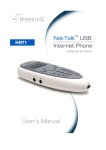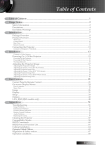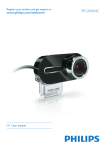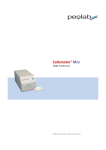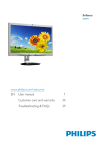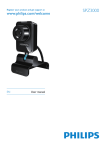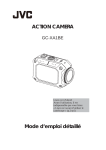Download Philips Notebook webcam SPC640NC
Transcript
Register your product and get support at www.philips.com/welcome EN User manual SPC640NC E n g lish Contents 1 Your WebCam Welcome What’s in the box Functional overview 2 Getting started Install the webcam software Connect the webcam to your PC / notebook 3 Adjust webcam settings WebCam Companion Image settings menu Audio settings menu Property pages 2 2 2 3 4 4 6 7 7 7 8 9 4 Operate the webcam with video calling and chatting 13 7HFKQLFDOVSHFLÀFDWLRQV 14 6 Frequently asked questions (FAQ) 15 7 Service and support Need help? Information to the customer 18 18 18 EN 1 1 Your WebCam Congratulations on your purchase, and ZHOFRPHWR3KLOLSV7RIXOO\EHQHÀWIURPWKH support that Philips offers, register your product at www.philips.com/welcome. At www.philips.com/welcome, select your language and choose ‘Register my product’. Then follow the onscreen instructions for registration. Please read the following instructions carefully, and retain them for future reference. It may be helpful to have the instructions for use for the PC at hand for reference. can be easily edited using image or video editing programs. The following sections in this manual give a step-by-step description of the installation process and explain how to use the Philips SPC640NC webcam. What’s in the box Please check that the following items are packed in the Philips SPC640NC box. They are provided to help you set up and use your Philips webcam. Philips SPC640NC webcam Welcome The Philips SPC640NC webcam you have just purchased is manufactured to the highest standards and will give you years of troublefree use. Brilliant images and amazing sound quality, that’s what you get with the SPC640NC webcam. After installation, the new webcam can be used for all sorts of applications, such as: Video: use the Philips SPC640NC webcam for video chatting and video calling.The webcam works with Skype,Windows® Live Messenger,Yahoo! Messenger, AOL Messenger etc.; Video sharing: make your own personal videos and share them with friends and family via YouTube, Yahoo! Video, etc.; Video e-mail / Video capture: create your own video presentations, video mail, product demonstrations, training videos, Internet clips etc.; Snapshot images: use images in presentations, create postcards, or send them via e-mail. Editing and special effects: after recording the images you want with the Philips SPC640NC webcam, the images 2 EN CD-ROM for video and audio enhancement (including user manual) SPC640NC Installation CD v.1.00 9082 100 03367 a E n g lish Functional overview g b f c d e a Snapshot button Take photos directly without the mouse. b Focus ring Adjust the focus of the image manually. c Rotating joint &KDQJHWKHYLHZLQJÀHOGRIWKH webcam manually. d Clamp with rubber rims 0RXQWWKHZHEFDPRQ\RXUÁDW panel) PC monitor or notebook screen. Fold the clamp when the webcam is placed on a desk or (large) desktop monitor. e USB connector Connect the webcam to the USB port of the notebook or desktop PC. Supply power to the webcam when it is connected to the notebook or desktop PC. f Digital microphone Capture voice and sound during video calling and recording. g Power LED Light up when the webcam is in use. EN 3 2 Getting started Install the webcam software The software supplied only works on PCs with the operating systems Microsoft® Windows® XP (SP2), Vista and Windows 7. See ‘Information to the customer - System requirements’. Note Before you start, unplug all your USB devices (except USB keyboard and USB mouse). Do not plug in your webcam yet. Run the 3 When the welcome screen appears, click ‘Next’ to continue. 4 When the ‘Manual’ screen appears, select the second option, then click ‘Next’ to continue installation. ,QVWDOODWLRQ&'520ÀUVW Have your Windows® CD-ROM at hand. If you connect the webcam without installation of the CD-ROM, you will not be able to use the features available in Philips applications. 1 Place the installation CD-ROM onto the CD-ROM / DVD drive of your PC / notebook. 2 When the language selection screen appears, select your language. If the language selection screen does not appear automatically, open ‘Computer’ or ‘My computer’, double click on the CD, then double click on the ‘Setup.exe’ icon. Installation continues automatically. 4 EN When the ‘Installation’ screen appears, click ‘Next’ to install all items. if you do not want to install any item except ‘WebCam Driver SPC640NC’ and ‘Philips CamSuite’, uncheck the item, then click ‘Next’. E n g lish 5 8 6 When the ‘Reboot’ screen appears, select ‘Yes’, then click ‘Finish’ to restart your PC / notebook. When the software license agreement appears, click ‘Yes’ to continue installation. » The ‘Philips CamSuite’ shortcut ‘ ’ will be visible in the Windows taskbar (bottom right of your screen). 7 Tip When the following screen appears, click ‘Next’ to continue. In the ‘Philips CamSuite’, you can adjust the webcam settings. See ‘Adjust webcam settings’. EN 5 Connect the webcam to your PC / notebook Before you connect the webcam to the PC / notebook, make sure to run the installation CD ÀUVW6HH¶,QVWDOO,QVWDOOWKHZHEFDPVRIWZDUH· 3 3 2 2 1 2 Turn on the PC / notebook. 3 Use the clamp to mount the webcam on your PC monitor or notebook screen. Fold the clamp to place the webcam on a desk or (large) desktop monitor. 4 Aim the webcam as needed. 6 EN Connect the cable to the USB port of the PC / notebook. Wait for completion of the LQVWDOODWLRQIRUÀUVWWLPHXVHRQO\ until the following balloon appears at the bottom right corner of the screen. You can adjust all SPC640NC webcam settings on respective property pages. However, through the Philips CamSuite application, you can easily access a number of the most used settings (properties). When you activate the instant messaging or VoIP service (Skype, Windows® Live Messenger, Yahoo! Messenger, etc.), the Philips CamSuite control panel appears automatically. You can also double click ‘ ’ on the Philips CamSuite icon in the Windows taskbar (bottom right of your screen) to access the control panel. upload your videos to YouTube directly. To launch WebCam Companion, click in the Philips CamSuite control panel. Or double click on the WebCam Companion icon on the desktop. E n g lish 3 Adjust webcam settings Tip For detailed information on how to use WebCam Companion, see the ‘Help’ menu or press the ‘F1’ button within the application. If WebCam Companion has not been selected during installation, the WebCam Companion icon will not be visible on the desktop. When you click , an error message will appear. For details about installation, see ‘Install - Install the webcam software’. If you are already using the webcam in another application, you will not be able to see any image in the viewer of the WebCam Companion. Image settings menu In the [Image Settings] menu, you can choose available image features. 1 Click the button in the Philips CamSuite control panel to open the [Image Settings] menu. 2 Check the box before an item to activate that item. 3 Click item. The settings available on the Philips CamSuite control panel include: : WebCam Companion; : Image settings; : Audio settings; : Advanced settings (Property pages). WebCam Companion Via WebCam Companion, you have access to the following webcam features: capture images; make video recordings; adjust monitor settings; broadcast your videos over the Internet; to open the control panel for that EN 7 To close the control panel for the selected item, click . To return to the Philips CamSuite control panel, click again. Digital zoom With this function, you can get a closer view of an object. 1 Press to open the [Digital Zoom] control panel. Note 'LJLWDO]RRPPDJQLÀHVWKHSL[HOVEXWQRWWKH actual image. It degrades image quality. Face tracking If you activate the [Face tracking] option, the webcam will track your face. This gives you more convenience during video chatting, because you stay in the centre of the image even if you move during video chatting. Just check the box before [Face tracking] to activate this option. Audio settings menu 2 Use the slider to dynamically zoom in and out. » The frame shows the position to the overall image. The frame increases / decreases according to the zoom factor. » Use the panning arrows (left / right / up / down) to move the frame. » Use the center button to position the frame in the center of the image. 8 EN In the [Audio Settings] menu, you can optimize the audio quality. Click the button in the Philips CamSuite control panel to open the [Audio Settings] menu. Noise reduction :LWKWKLVIXQFWLRQ\RXFDQVLJQLÀFDQWO\ reduce all stationary noises picked up by the webcam’s microphone, such as air conditioner noise and the noise made by the fan inside your computer. It enhances clarity of speech in both quiet and noisy environments. General settings E n g lish The result is more listening comfort and easier communication. Just check the box before [Noise Reduction] to activate this option. Property pages On the [Properties] pages, you can adjust all available SPC640NC webcam settings (properties). Note You can adjust the following general settings: For easy access to the most used webcam settings (Image, Audio), open the Philips CamSuite control panel and make settings as described in the previous chapters. Click the button in the Philips CamSuite control panel to open the [Properties] pages. » The ‘[General] settings screen appears. [Flickerless image] The [Flickerless image] option should only EHXVHGXQGHUÁLFNHULQJOLJKWFRQGLWLRQV HJÁXRUHVFHQWRUQHRQODPSVWRSUHYHQW ÁLFNHULQJRUVWUDQJHO\FRORUHGYLGHR images. If this option is used under normal lighting conditions, the video image may be overexposed. [Region] During installation, this parameter will be set automatically to the correct region frequency. When you travel, you may need to change the setting to optimize the image quality. The region frequency settings for different countries are listed below. EN 9 Country (region) Europe North America China Taiwan Japan Region frequency 50 Hz 60 Hz 50 Hz 60 Hz Region-dependent Tip 3OHDVHFKHFN\RXUORFDOPDLQVRXWSXWWRÀQG the correct [Region] setting. You can now adjust the following video settings: [Full automatic control] This full automatic control mode provides a very easy way to get the best out of your Philips SPC640NC webcam. Or you can choose to have maximum manual control over the webcam settings by switching the full automatic control mode off. Full automatic control ‘on’ is the preferred setting for normal use. Techniques active within full automatic control mode are: Video settings Click the [Video] tab. » The [Video] settings screen appears. [Frame rate] A frame is a single picture or still shot, that is shown as part of a larger video or movie. The frame rate is the number of frames displayed per second. The higher the frame rate, the better the video display but the higher the load on the processor. You can use the scroll open menu to set the frame rate of the video that you wish to capture. For example, 30 fps means that the webcam will capture video at 30 frames per second. [Auto Exposure] The exposure is the amount of light received by the sensor and is determined by how long the sensor is exposed to capture a snapshot or video frame. The result depends on the VHQVLWLYLW\RIWKHVHQVRU7KHZHEFDPZLOOÀQG the optimal setting if you select the automatic exposure option. Note 7RFKDQJHWKHYLGHRUHVROXWLRQÀQGDQGXVH the corresponding function available in the WebCam Companion. 10 EN [Shutter Speed] The shutter speed determines how long the camera shutter remains open as a picture is taken. The slower the shutter speed, the longer the exposure time. The shutter speed controls the total amount of light reaching the sensor. Use the slider to set the desired shutter speed. [Reset] Press this button if you would like to reset the webcam settings to the default factory settings. [Restore] Press this button if you would like to restore your personal preferred settings. [Save] Press this button if you would like to save your personal preferred settings. [Auto White Balance] Most light sources are not 100% pure white but have a certain ‘color temperature’. Normally our eyes compensate for lighting conditions with different color temperatures. If the automatic white balance is selected, the webcam will look for a reference point which represents white. It will then calculate all other colors based on this white point and compensate the other colors accordingly, just like the human eye. <RXFDQDOVRVHOHFWÀ[HGVHWWLQJVIRU[Indoor], [Outdoor] and [Fluorescense] conditions or use the ‘Red’ and ‘Blue’ effect if you would like to set the webcam according to your personal color temperature preferences. [Brightness] Brightness enables you to adjust the brightness of the displayed image or video to suit your RZQSUHIHUHQFH8VHWKHVOLGHUWRÀQG\RXU preferred setting. [Contrast] Contrast enables you to control the ratio between dark and light according to your RZQSUHIHUHQFH8VHWKHVOLGHUWRÀQG\RXU preferred setting. E n g lish [Gain] In video, gain is the amount of white in a video picture. Use the slider to set the desired gain level. [Gamma] Gamma enables you to brighten dark areas within the displayed image or video and visualize more details without over-exposing DOUHDG\OLJKWDUHDV8VHWKHVOLGHUWRÀQG\RXU preferred setting. [Saturation] Saturation enables you to set the color reproduction from black and white to a full color image or video according to your RZQSUHIHUHQFH8VHWKHVOLGHUWRÀQG\RXU preferred setting. [Black & White] The [Black & White] checkbox is used to switch from color images to black and white and back. [Backlight compensation] Turn on the backlight compensation to improve the image quality when you have a scene where the background has a high illumination level (for instance when you are sitting in front of a bright light). [Mirror] :KHQ\RXHQDEOHWKLVIXQFWLRQWKHLPDJHÁLSV horizontally. You can use this feature when you want to use the Philips SPC640NC and monitor as a mirror, or to take pictures of mirrored images. EN 11 Audio settings Features settings Click the [Audio] tab. » The [Audio] settings screen appears. You can now adjust the audio volume setting: [Noise Reduction] For an explanation of the feature and information on how to activate it via the Philips CamSuite control panel, see ‘Adjust webcam settings -Audio settings menu - Noise reduction’. Volume slider This slider provides manual control over the microphone. 12 EN Click the [Features] tab. » The [Features] settings screen appears. You can now adjust the following feature settings: [Face tracking] For an explanation of the feature and information on how to activate it via the Philips CamSuite control panel, see ‘Adjust webcam settings - Image settings menu - Face tracking’. [Digital Zoom] For an explanation of the feature and information on how to activate it via the Philips CamSuite control panel, see ‘Adjust webcam settings - Image settings menu Digital zoom’. E n g lish 4 Operate the webcam with video calling and chatting The Philips SPC640NC webcam works with instant messenging and VoIP (Voice over Internet Protocol) applications such as Skype, Windows Live Messenger, Yahoo! Messenger and AOL Instant Messenger. After installation of an application, make the required webcam settings within the application in order to be able to properly use the webcam YLDWKHVSHFLÀFDSSOLFDWLRQ Tip For details, see the help function of the application and ‘Adjust webcam settings WebCam Companion’. EN 13 5 Technical specifications Sensor Real video resolution (Max.) Real still image resolution (Max.) Interpolated still image resolution (Max.) Frames per second F-number Lens view angle Interfacing USB cable length Microphone Power Voltage requirements 14 EN VGA CMOS 640 x 480 640 x 480 1280 x 960 30 fps (maximum) 2.6 55 degrees USB 2.0, UVC compliant 1m Digital built-in Supplied via USB cable 5V ( ), 0.5A E n g lish 6 Frequently asked questions (FAQ) How can I adjust image quality? The default settings of the Philips SPC640NC webcam usually offer the best possible image quality. It might be possible that you are not FRPSOHWHO\VDWLVÀHGZLWKWKHFXUUHQWLPDJH quality. In this case, follow the steps below to adjust image quality according to you own personal preferences. 1 Open a webcam viewer such as WebCam Companion or an instant messaging service such as Skype, Windows® Live Messenger or Yahoo! 0HVVHQJHUWRVHHZKDW\RXDUHÀOPLQJ » The Philips CamSuite control panel appears automatically. » If the Philips CamSuite control panel does not appear automatically, double click on the Philips CamSuite icon ‘ ’ in the Windows taskbar (bottom right of your screen) to open it. 2 Click the button to open the [Properties] page. » The [General] settings screen appears. 3 Check the [Region] setting for the webcam and adjust if necessary. Select ‘50 Hz’ for Europe and China. Select ‘60 Hz’ for North America and Taiwan. For other regions, check your local PDLQVRXWSXWWRÀQGWKHFRUUHFW [Region] setting. 4 5 Click [Ok] to save your settings. 6 Adjust the gamma value of the displayed image or video.The gamma setting enables you to visualize more details. Use the VOLGHUWRÀQG\RXUSUHIHUUHGVHWWLQJ Slide to the left to see more details; slide to the right to see less details. Click the [Video] tab. » The [Video] settings screen appears. EN 15 7 8 5 Set the Philips SPC640NC webcam or the connected headset as default device for ‘Voice recording’. 6 Click ‘OK’ to save your settings. Adjust the brightness of the displayed image or video. Use the slider WRÀQG\RXUSUHIHUUHGVHWWLQJ6OLGLQJWR the left makes the image darker; sliding to the right makes the image brighter. For Windows Vista: Click [Ok] to save your settings. 1 Click the Windows ‘Start’ button (bottom left of your screen). 2 3 4 5 Open the ‘Control panel’. 6 Select the Philips SPC640NC webcam or the connected headset and click ‘Set Default’. 7 Click ‘OK’ to save your settings. Note 7RFKDQJHWKHYLGHRUHVROXWLRQÀQGDQGXVH the corresponding function available in the WebCam Companion. The microphone of my Philips SPC640NC webcam or headset does not work (properly). What should I do? Click ‘Hardware and Sound’. Click ‘Sound’. Click the ‘Recording’ tab in the screen that appears. For Windows XP (SP2): 1 Click the Windows ‘Start’ button (bottom left of your screen). 2 3 4 Open the ‘Control panel’. Click ‘Sounds and Audio Devices’. Click the ‘Voice’ tab in the screen that appears. Using my Philips SPC640NC webcam makes my PC / notebook run slow. What should I do? 16 EN 1 Close software applications that do not necessarily need to run. 2 Double click on the Philips CamSuite icon in the Windows taskbar (bottom 3 3 Click the [Video] tab. » The [Video] setting screen appears. Click the button to open the [Properties] page. » The [General] settings screen appears. 4 4 Click the [Reset] button. » All webcam settings are now reset back to the default factory settings. Click the [Video] tab. » The [Video] setting screen appears. 5 Click [Ok] to save your settings. 5 Check whether [Full automatic control] is enabled (box checked). If it is enabled, uncheck the box to disable [Full automatic control]. 6 7 Set [Frame rate] to a minimum of 5 fps. E n g lish right of your screen) to open the Philips CamSuite control panel. Click [Ok] to save your settings. Note The maximum frame rate (frames per second (fps) produced by the webcam) and the maximum image resolution depend on the VSHFLÀFDWLRQVRI\RXU3&QRWHERRN7KH webcam software will automatically adjust frame rate and resolution as good as possible for your particular situation. It might be SRVVLEOHWKDWWKHVSHFLÀFDWLRQVRI\RXU3& notebook do not meet the requirements for maximum frame rate and resolution setting. No image is available on the screen. What should I do? 1 Ensure that the webcam is connected properly. 2 Check whether you are using the webcam in another application. 3 You cannot use the webcam in more than one application at the same time. Close the application. How can I restore my Philips webcam to the default factory settings? 1 Double click on the Philips CamSuite icon in the Windows taskbar (bottom right of your screen) to open the Philips CamSuite control panel. 2 Click the button to open the property pages. » The [General] settings screen appears. EN 17 7 Service and support Need help? First of all, read this user manual carefully. When you have additional questions about setup, usage, warranty, etc. of the SPC640NC, see www.philips.com/support. 1 At ‘www.philips.com/support’, select your country / language. 2 Enter ‘SPC640NC’ after ‘Model number or keyword’ and click ‘Search’. 3 Click ‘SPC640NC’ under ‘Your results’. 8QGHU¶3URGXFWVXSSRUW·\RXZLOOÀQG information about setup and usage, user manuals, software update and frequently asked questions. 8QGHU¶6HUYLFH·\RXZLOOÀQG information on warranty. Telephone numbers of Philips Consumer Care helpdesk can also be found on this website. The model number of your webcam is SPC640NC. Information to the customer If your webcam gets wet, dry it with soft cloth as soon as possible. If the lens is dirty, do NOT touch the lens ZLWK\RXUÀQJHUV Clean the outside of the webcam with a soft cloth. 'R127XVHFOHDQLQJÁXLGVEDVHGRQ alcohol, methylated spirit, ammonia, etc. Do NOT attempt to disassemble or repair your webcam by yourself. Do not open the webcam. In the event of WHFKQLFDOGLIÀFXOWLHVUHWXUQLWWR\RXU Philips retailer. Do NOT use your webcam in the water. Protect the webcam from oil, vapour, steam, moisture, and dust. Never point the webcam lens at the sun. Copyright Copyright © 2009 by Philips Consumer Lifestyle B.V. All rights reserved. No part of this publication may be reproduced, transmitted, transcribed, stored in a retrieval system or translated into any language or computer language, in any form or by any means, electronic, mechanical,magnetic, optical, chemical, manual or otherwise, without prior written permission from Philips. Brands and product names are trademarks or registered trademarks of their respective companies. Safety precautions Observe the following guidelines to ensure that the webcam will operate safely and to prevent defects. Do not use your webcam in environments outside the following range: temperature: 0°C to 40°C, relative humidity: 45% ~ 85%. Do not use or store your webcam in/ under: direct sunlight exposure; very humid and dusty environment; near any kind of heat sources. 18 EN Disclaimer Philips makes no warranty of any kind with regard to this material, including, but not limited to, the implied warranties of PHUFKDQWDELOLW\DQGÀWQHVVIRUDSDUWLFXODU purpose. Philips assumes no responsibility for any error that may appear in this document. Philips makes no commitment to update nor to keep current the information contained in this document. Environmental information This device complies with Part 15 of the FCC Rules. Operation is subject to the following two conditions: Disposal of your old product Your product is designed and manufactured with high quality materials and components, which can be recycled and reused. E n g lish FCC compliance a this device may not cause harmful interference, and b this device must accept any interference received, including interference that may cause undesired operation. Note This equipment has been tested and found to comply with the limits for a Class B digital device, pursuant to Part 15 of the FCC Rules. These limits are designed to provide reasonable protection against harmful interference in a residential installation. This equipment generates, uses and can radiate radio frequency energy and, if not installed and used in accordance with the instructions, may cause harmful interference to radio communications. However, there is no guarantee that interference will not occur in a particular installation. If this equipment does cause harmful interference to radio or television reception, which can be determined by turning the equipment off and on, the user is encouraged to try to correct the interference by one or more of the following measures: Reorient or relocate the receiving antenna. Increase the separation between the equipment and receiver. Connect the equipment to an outlet on a circuit different from that to which the receiver is connected. Consult the dealer or an experienced radio/TV technician for help. $Q\XQDXWKRUL]HGPRGLÀFDWLRQWRWKLV equipment could result in the revocation of the authorization to operate the equipment. When this crossed-out wheeled bin symbol is attached to a product, it means the product is covered by the European Directive 2002/96/ EC. Please be informed about the local separate collection system for electrical and electronic products. Please act according to your local rules and do not dispose of your old product with your normal household waste. The correct disposal of your old product will help prevent potential negative consequences to the environment and human health. All redundant packing material has been omitted. We have done our utmost to make the packaging easily separable into mono materials. Please observe the local regulations regarding the disposal of packing materials. Warning Plastic bags can be dangerous.To avoid danger of suffocation, keep this bag away from babies and small children. EN 19 System requirements Microsoft ® Windows® XP (SP2), Vista or Windows 7; Intel Pentium® IV, 850Mhz or equivalent; 512 MB RAM (for XP) or 1 GB RAM (for Windows Vista and Windows 7) with 200 MB free hard disk space; One free USB port (USB 2.0) and CD-ROM or DVD drive. Disclaimer of warranty The software on the CD-ROM supplied is sold ‘as is’ and without warranties whether expressed or implied. Because of the various software and hardware environments into which this program may be put, no warranty RIÀWQHVVIRUDSDUWLFXODUSXUSRVHLVRIIHUHG Limitations of damages The vendor will not be liable for any indirect, special, incidental or consequential damages (including damages for loss of business, loss RISURÀWVRUWKHOLNHZKHWKHUEDVHGRQ breach of contract, tort (including negligence), product liability or otherwise, even if the vendor or its representatives have been advised of the possibility of such damages and even if a remedy set forth herein is found to have failed its essential purpose. 20 EN © 2009 Koninklijke Philips Electronics N.V. All rights reserved. SPC640NC_00_UM_V1.0






















